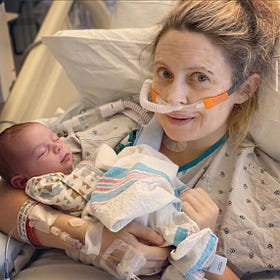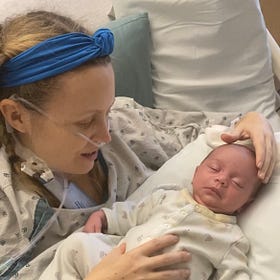Lessons in the Unexpected
My year as a hospital volunteer
How’s your spirit, readers? (as my favorite hospital chaplain likes to ask).
Above is a photo of me on my first day as a hospital volunteer. Every week, I go to the place where my life was saved to give back.
But I’ve discovered it’s me who’s received so much grace and knowledge from the experience.
It’s been a lesson in the unexpected and being open to navigating discomfort. Especially for a friendly introvert like me…
My experiences have been profound - making this space every week isn’t easy, but I’ve found I want to help people on the days when life isn’t fair.
Lessons in Volunteering
For the past year, I’ve had the privilege of being a Patient and Family Services volunteer at the hospital.
You’d think I wouldn’t want to go near that place, but I felt this calling to return and help people. It’s odd to me that this place of trauma and turmoil somehow has taken on this new role in my life. I feel excited to be there. While it is a setting of immense difficulty, it’s also where I experienced a great amount of healing.
It’s almost as though I feel that I have won returning as I do, as strong as I am.
I’ve come so far and it’s a weekly reminder.
I wish I had a visitor to my hospital room like myself; someone helpful who comes in and asks, “Is there anything I can do to make this moment in time just a little bit better?”
Sometimes my assistance is practical - like getting someone water or helping someone shop for slippers from the gift shop. Often it is advice, like helping folks navigate life in the hospital, communicating with medical staff effectively, or informing patients they have a social worker to help with transitions. And sometimes, the support is more emotional as I’d hold space for a patient’s anxiety, fear, or despair.
The experience is a lesson in the unexpected. I never know what I’ll face on the other side of the door or curtain.
Each day I volunteer, I’m given a floor or wing. I get a long list of names, ages, and physicians and nothing else.
I sanitize my hands and welcome the unknown.
Usually it’s some combination of pain, frustration, exhaustion, or boredom from both the patients and the caregivers.
I’m pretty aware when I’m not welcome - not everyone wants a visitor and I don’t judge.
Generally people are grateful to see me. When I tell them I know what it’s like to be in those grippy hospital socks, they get curious. As I start to open up, they do too.
I’ve got a new super-power of not flinching at the cringeworthy. I have the ability to look difficulty and pain in the eyes. I can now push past discomfort - be it a seeping wound, or major trauma injury or exposed stitches on a shaved scalp.
To think I used to get dizzy helping my mom’s mole removal wound. You’ve come a long way, baby.
There are patients and families I’ll never forget. I’ve changed some identifiable traits for privacy.
On my first day volunteering, I met an amazing young couple. The husband had received brain surgery after a tumor and stroke. He clearly had a large scar, mobility challenges and some difficulty speaking - but his comedic timing was razor sharp. The room was full of laughter despite the challenges. His wife showed me a picture of him mountaineering when he was well and he was unrecognizable. He looked 20 lbs stronger, as healthy as could be. The man in the picture looked invincible.
And yet, as I looked at him in the chair - surviving this experience, but covered in the damage it’s left- there was still that invincible twinkle in his eyes.
He then asked for his wife to show me the dance video from their wedding on his phone.
Tears begin rolling down her cheeks. She looks at me and says, “I thought he forgot our wedding day.”
She helps him pull up photos from their beautiful beach wedding. Big smiles and even bigger flower arrangements.
I’m so grateful I could be a bridge to that beautiful moment of connection - knowing inside him, the story of their love with all the memories of their life together remained with him. It was an incredible honor to witness.
Another woman looked at me with a big smile when I walked into her room. She looked in her 70s and had just woken from a coma. With her weak but gregarious smile, she says, “I saw you! I knew you were coming.”
I smiled back and said, “I bet you did.”
Her son, in his twenties, was by her side working remotely on his laptop from the recliner - a bit embarrassed, “Mom, this is a volunteer.”
“Yes, but I saw her in my dream.”
We sat and chatted for a while and I mentioned I had been sick and the woman was deeply interested in my near death experiences.
“I also felt like I was in an airport!” she exclaimed. “I know what you mean.”
“Maybe, you were there too.”
“Yes, but it’s not my time yet. My husband will come to meet me when it is” she said with another knowing smile.
“I’m sure you’re right about that.”
One young man in his early 20s was in the hospital for a month. His parents never came and he seemed both strong and naive at the same time. I helped him navigate the hospital system and get the resources he needed, as well as some spiritual support and a puppy volunteer visit.
I got the sense he was very much on his own in the world.
As each week went by, I saw him go from anxious, to bored, to sad about losing his new first-ever real job while in the hospital, to resolved that he would spend his birthday there, to bleakly depressed, and hopeful for release to a rehab facility closer to his mom in San Diego.
As he left, he asked to keep in touch on Instagram. Despite how alone he was his entire stay, I was shocked to find he had hundreds of thousands of followers. He also didn’t share his hospital stay on socials, so to everyone on the platform, he looked healthy and fine.
It reminded me, we never know what someone’s life is like based on their social media. Not one bit.
I’ve also talked to many patients who were quite “out of it.”
One older wrinkled and gray woman thought I was her daughter, reaching for my hand and crying out, “You never understood!! You never understood.”
I held her wrinkled hand gently and said, “Rest now. All you have to do now is rest. Everything else will get sorted out later. Rest easy now.”
Not every visit ends well or resolves.
One room I entered to see a young frail woman with gorgeous dark hair that looked well cared for. Quite gaunt, she laid, sleeping peacefully. A handsome husband was smiling with a friend and they seemed to be laughing in a playful way.
I whispered softly about what a beautiful energy they had despite what looked like a hard situation.
He looked at me and said, “My wife’s family wants to pull the plug and I want to give her more of a chance.”
A hot pressure bubbled up to my cheeks as I realized I had read the room so wrong. It was a lesson in the unexpected.
I know so well that laughter and profound pain often find each other.
“I’m so sorry,” tumbled out of my mouth.
Before I had time to regroup and provide any support, a doctor appeared in the door and I stepped aside to let them meet.
In the hallway outside, I took a hard breath. The gravity of the family’s situation hung on me like a weight.
I carried the image of the sleeping woman home with me. I carry her now.
I could go on and on and on about my patient stories - from seeing a woman go home after five months to the young girl with a brain injury who was there weeks and only wanted to talk about making films or the Russian grandpa I taught solitaire to.
Honestly much of my work as a volunteer is to simply chat and with the power of distraction, long, excrutiating minutes go by easier.
For the many scared patients, I can’t promise healing, but I do promise hope.
Most days, I leave the hospital exhausted. I get home and lay down. I send a blessing to all the patients and I rest knowing I’ve done something rewarding with my energy.
These patients have given back to me as much as I’ve given to them.
COMMENT OF THE WEEK
“This is so well written! I love the way you focus on the small moments of humanity that you experienced.” Elizabeth
How to choose a movie when you might die before the end...?
Thanks for continuing this journey with me. Maybe you’re thinking, damn- this is relentless… and it truly was. What I went through was astounding.
If you’re new here and wondering, “what happened to this lady?” read:
Welcome to my disease. What is atypical Hemolytic Uremic Syndrome (aHUS) or Complement-Mediated Thrombotic Microangiopathy (CM-TMA)?
Hi, If you’re new here, I started writing a book six months ago when I was on dialysis. It’s intended to be both memoir and a practical tool to help folks who might be going through something similar or those caregivers and family supporting someone with a challenging diagnosis. I hope to include excerpts here as I write. NOTE: This is not intended to r…
I started writing this when I was on dialysis. It’s intended to be both memoir and a practical tool to help folks who might be going through something similar or those caregivers and family supporting someone with a challenging diagnosis. NOTE: This is not intended to replace actual medical guidance. Please consult your doctors on your individual challenges and situations. Please talk to your clinicians before adjusting any of your care protocols. Also names have been changed for most of my medical staff.
Thank you to new paid subscriber EA Cosper - I’m so grateful for your support.
Thank you to CC Couchois, Roy Lenn, and Dr. Richard Burwick for your founding level donation.




What a wonderful piece. As the sole survivor of a 5 person family who all passed thru the misshapen doors of strange cancers, I appreciate that you walk this path that others cannot. I wish I could go back and be that person. Thank you, on behalf of us, who were "protected" from sadness (reality) for being there to bear witness to such cathartic and powerful moments.